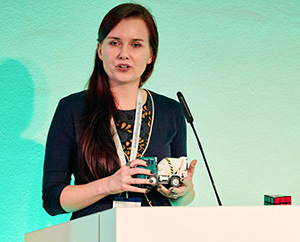Main Content
On the Global Trail of the German Construction Industry: Monika Motylinska Receives Freigeist Fellowship from the VolkswagenFoundation.

What have German construction companies like Bilfinger Berger and HOCHTIEF contributed to the globalisation of architecture? Never before has this question been examined comprehensively, from the perspective of different disciplines. For her groundbreaking project idea, IRS architectural historian Monika Motylinska received a Freigeist Fellowship from the Volkswagen Foundation. The funding will allow Motylinska to conduct research for five years while training up to three doctoral students. This junior research group will be associated with the Bauhaus University Weimar. As an institute of the Leibniz Association, the IRS is thus the only non-university research institution with a Freigeist Fellow in the current funding round.
Concrete, Capital, Ideas: Construction Companies as Analytical Prisms
The project developed by Monika Motylinska and based in the Department for Historical Research of the IRS is entitled "Conquering (with) Concrete. German Construction Companies as Global Players in Local Contexts". It examines how large German construction companies conquered markets and spaces, literally cementing their presence in different regions of the Global South. For the question of cement production is central. Knowledge and control over the production and distribution of cement were and are formative factors in the ability of construction companies to enter new markets.
But the project looks further. It aims to use construction companies as analytical prisms: for the coming together of material and immaterial factors such as capital, knowledge, technical standards and architectural ideas, but also different disciplinary perspectives: Architectural and building history, urban studies, economic geography, governance, ecology and anthropology. The legacy of German construction companies in the Global South and the persistence of the label "Made in Germany" in the construction industry will also be considered. Using case studies in Brazil, India and Nigeria, the focus will be on how the German architectural export of the 20th century has adapted to different local conditions, and how this heritage is dealt with - for example in the protection of historical monuments.
Freigeist Fellowships: Bold Projects that Push the Envelope
The aim of this comprehensive project is thus to go off the beaten track and make new conceptual and empirical connections. The Freigeist Programme serves to facilitate precisely such bold steps. The Volkswagen Foundation's press release of 03.09.3019 states: "The Volkswagen Foundation's Freigeist Fellowships are aimed at unusual and courageous lateral thinkers from all disciplines in the first four years after their doctorate. The term reflects the programme's subject-specific openness; the selected researchers are expected to think beyond the known: to become a Freigeist Fellow, the young research personalities must not only bring outstanding subject-specific expertise to the table, but also look beyond the boundaries of their own discipline and combine critical analytical ability with new perspectives and approaches to solutions."
Motylinska is one of a total of nine Freigeist Fellows funded in the current round - and the only one based at a non-university research institution. Around 90 researchers had submitted ideas by the deadline last October. The funding amount for Motylinska's project is €1,060,000, of which €830,000 will be covered by the Volkswagen Foundation. The remaining amount will be borne by the IRS as co-financing. Johan Lagae, professor at Ghent University, acts as external mentor for the project.
Monika Motylinska studied monument conservation and heritage studies at the Nicolaus Copernicus University in Torun/Thorn (Poland) from 2005 to 2009. She followed this up with her Master's degree in art history and art technology at the Technical University of Berlin. From 2012 to 2016, she completed her doctorate in art history at the TU Berlin, funded by a doctoral scholarship from the German National Academic Foundation. In her work, she combined approaches from the fields of architectural history, monument preservation and historical urban studies.
Motylinska appreciates the great openness of the Freigeist Fellowship Programme. "Since I first heard about Freigeist in 2014, it was clear to me that I would choose this option for my further academic path because it supports projects with unpredictable outcomes that do not fit into a disciplinary delimited framework," she says. "It is also important to me that a Freigeist Fellowship offers fair working conditions for the whole research team, such as three-year employment contracts with social security for PhD students instead of stipends."
The new Freigeist Fellowships were officially awarded in Hanover on Friday 13 September 2019.

